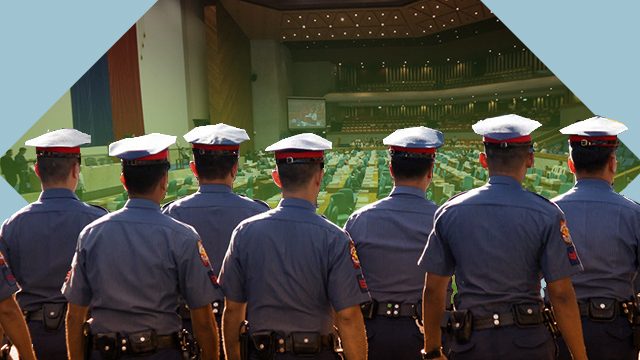SUMMARY
This is AI generated summarization, which may have errors. For context, always refer to the full article.

MANILA, Philippines – The House of Representatives approved Tuesday, May 15, a bill adopting military rank naming for the Philippine National Police (PNP).
Voting 166-6, without abstention, the House approved on the third and final reading House Bill 5236, which seeks PNP officers to have the following change of titles:
- Director General to Police General
- Deputy Director General to Police Lieutenant General
- Director to Police Major General
- Chief Superintendent to Police Brigadier General
- Senior Superintendent to Police Colonel
- Superintendent to Police Lieutenant Colonel
- Chief Inspector to Police Major
- Senior Inspector to Police Captain
- Inspector to Police Lieutenant
The following shifts in naming, meanwhile, are sought to be adopted for non-commissioned officers:
- Senior Police Officer IV to Police Master Sergeant
- Senior Police Officer III to Police Technical Sergeant
- Senior Police Officer II to Police Staff Sergeant
- Senior Police Officer I to Police Sergeant
- Police Officer III to Police Corporal
- Police Officer II to Patrolman First Class
- Police Officer I to Patrolman
This will be done by changing the current naming conventions set by Section 28 of Republic Act 6975 or the Department of the Interior and Local Government Act of 1990.
Why does this matter? According to the bill’s principal sponsor, Representative Romeo Acop of Antipolo, “the bill seeks to stop public and military confusion on how cops should be addressed.”
In a House statement, Acop said the change of designations would promote a “common understanding” among the members of the Armed Forces of the Philippines (AFP) and the PNP. Acop himself was a former police general.
It would enhance their efficiency in inter-agency operations, Acop added.
Law just for formality? In practice, however, cops already colloquially use military ranks in addressing each other.
Fresh graduates from the PNP Academy, for one, are widely called “teniente” (lieautenant), while many veteran cops do not say they want to be “Chief Superintendents” — they aspire to be called “Generals.”
It’s an old custom that even a law couldn’t kill as the country’s police force used to stand under the military as the Philippine Constabulary-Integrated National Police.
A lot of the PNP’s top officials, in fact, used to be part of the PC before the creation of the PNP.
For many in the police force, it’s only now that the convention is on its way to be reflected by the law.
Read the bill in full below:
– Rappler.com
Photo by Darren Langit; Graphic by Nico Villarete/Rappler
Add a comment
How does this make you feel?
There are no comments yet. Add your comment to start the conversation.